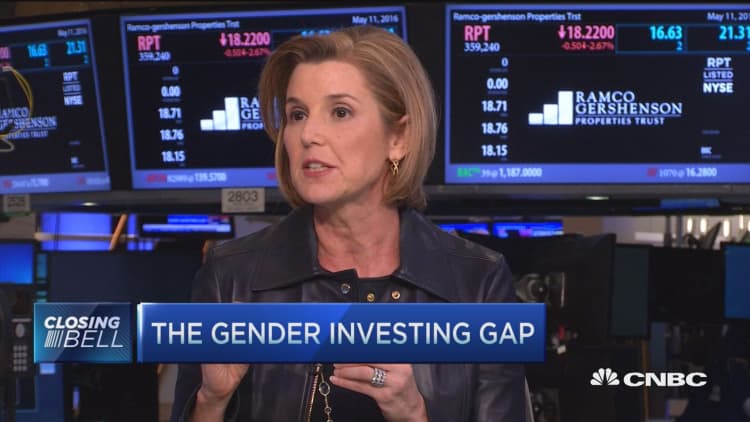
Sallie Krawcheck, one of the most powerful women in finance, today launched Ellevest, an online investment advisor for women that squarely takes aim at some of the industry's most cherished ideas — or myths — about gender and finance.
Women investors aren't emotionally driven, they don't need more financial education, and they aren't necessarily more risk averse, though their approach to risk is different, said Krawcheck, who gave CNBC an early look. Ellevest is still in beta, but investors can sign up for access.
"In this country today we have a gender investing gap. The stance has been, 'OK ladies, work harder. Learn more. Pick your ETF; pick your expense ratio.' But it hasn't worked nearly as well for women as well as it has for men," said Krawcheck. "If I were to go very Gloria Steinem on you, I'd say until we get this gap closed, we're not going to be equal."
Eyes have been trained on what Krawcheck would pull out of her comeback bag when she announced that she was taking on a problem that has long stymied the male-dominated investment world: how to capture the $11.2 trillion market of investable assets controlled by women.
The industry is littered with reports, task forces and initiatives on how to diversify — less than 15 percent of financial advisors are women — and serve women investors better. Citigroup last year reportedly closed its portal, Women & Co., one of the higher-profile attempts.
Still, some 60 percent to 70 percent of women say they are misunderstood by their advisors, said Sylvia Ann Hewlett, who with Andrea Turner Moffitt wrote an influential report on women investors called Harnessing the Power of the Purse.
Women's discomfort with investing comes at a high cost for them: They are apt to delay investing and more likely to run out of money in retirement.
In this country today we have a gender investing gap.Sallie Krawcheck
Hewlett said her report found women want six things: an advisor who understands them; one that helps them align their assets with the meaning and purpose of their lives — like their philanthropic goals, for instance; one that helps them reach their individual goals; an advisor that creates a safe space for them to articulate all of those; an advisor that is efficient and time sensitive and an advisor who communicates well.
Ellevest is betting on a sophisticated user interface to deliver this kind of nuance and understanding. It hired staff from Weight Watchers and Thrillist to develop the site, which has more the feel of a consumer website than an investing site. Ellevest also has built-in outreach, so that if women fall below a threshold for reaching their goals — say, they are 60 percent vs. 70 percent likely to reach a retirement goal — they will get an email telling them how to get back on track.
Krawcheck is known as an honest-but-tough industry survivor, a former Citigroup executive who also led the wealth management division of Bank of America until she was ousted in a restructuring. Some of the biggest names in finance are backing Ellevest, including Morningstar, which led a $10 million A round last fall, as well as Ajay Banga, CEO of MasterCard; Karen Finerman, co-founder of Metropolitan Capital Advisors and a CNBC Fast Money panelist; and Mohamed El-Erian, the former CEO of Pimco.
El-Erian said he invested in Ellevest because it lies in areas of his interest: market failures, and creating access for people who don't have access to finance. And, he said, he had followed Krawcheck's career from research analyst to strategic executive and believes a start-up has the best chance of the fundamental shift required to serve women investors well.
"It's a different mind-set, a passion for reconstructing investing," he said. "They are very serious about the mission of serving women investors."
Based on the look Krawcheck gave CNBC, Ellevest has a different sensibility than either traditional financial services or other online advisors: It's not focused on winning; there are no war or game analogies, and the words "expense ratio" don't show up anywhere obvious.
The website offers investors a speedy start; a few clicks take women (or men, who are allowed to sign up, too) into a relatively sophisticated financial-planning tool. Screens prompt them to fill out basics such as age, location and career path. Ellevest uses women-centric data such as women's salary trajectories (they tend to peak earlier than men's) and longer life spans to project financial needs.
Women are then asked to set their own goals, like starting a business or saving for a child's education, and given a portfolio (which they can adjust) to match the time horizon for each goal. It's a slightly controversial approach that means women could end up taking more or less risk than they ought to based on their age.
A 30-year-old who decides to focus on short-term, five-year goals, like saving for a house or to start a new business, would end up in a portfolio with less than 50 percent equities. Saving successfully for retirement probably requires a higher percentage of equities.
For now, the Ellevest team is personally looking at each financial plan to ensure clients have the right levels of risk based on their age, said Sylvia Kwan, chief investment officer, by email.
The firm is also assuming a 7.6 percent return on U.S. equities in retirement portfolios, which is slightly higher than the 6 percent to 7 percent return that some experts are forecasting now. (Assumptions like that are crucial to the question of whether advisors can deliver on the returns they estimate.)
The algorithm uses 21 different asset classes and has an emphasis on inflation protection with, for instance, global commodities and Treasury inflation-protected securities (TIPs) in its retirement accounts.
Ellevest offers clients 589 tax-deferred retirement account portfolios (IRAs), 589 similar portfolios for taxable retirement accounts (Roth IRAs) and 41 portfolios designed to help clients reach the shorter-term goals, like buying a house or saving for a wedding. The accounts are custodied at FolioFN.
It costs 0.5 percent of assets under management and has no account minimum, significantly less than many offline financial advisors who charge 1 percent a year or more and often have account minimums of $500,000 or more, but the fees are higher than some other online financial advisors. Clients also pay fees on the costs of the underlying investments, which include funds from Vanguard, iShares, VanEck (Market Vectors), SPDRs and First Trust.
But few clients will see much if any of the technical details of the site unless they ask. That's deliberate.
"What we heard from women is, 'I want to start a friggin' business. I want to have a baby. I don't care one bit about outperforming the market. Just get me there,'" Krawcheck said.
As for the $11.2 trillion question — why the industry hasn't been able to get this right so far — El-Erian boiled it down to behavioral theory. He said there are three reasons industries find it hard to adapt.
First, people may have blind spots. They can only see, for instance, wealthy women as widows or wives, and so don't serve the 62 percent of women with a net worth of $500,000 or more who are self-made.
Second, they reframe a problem, but in a familiar way: They may be aware that they need to serve women, but they leap to obvious answers, like having cards made up in pink — which might help, but don't result in a fundamental shift.
Or, he said, a big company is just hidebound, like IBM building a bigger mainframe when what it really needed to do was build a PC.
"It's like the American tourist in Paris who goes up to a French person to ask for help. Then he says the same thing again but louder."
Even when you try to reinvent yourself, you do the same thing. Ellevest's challenge is to reinvent the experience of investing, to capture the nuances that women want.
— By Elizabeth MacBride, special to CNBC.com




